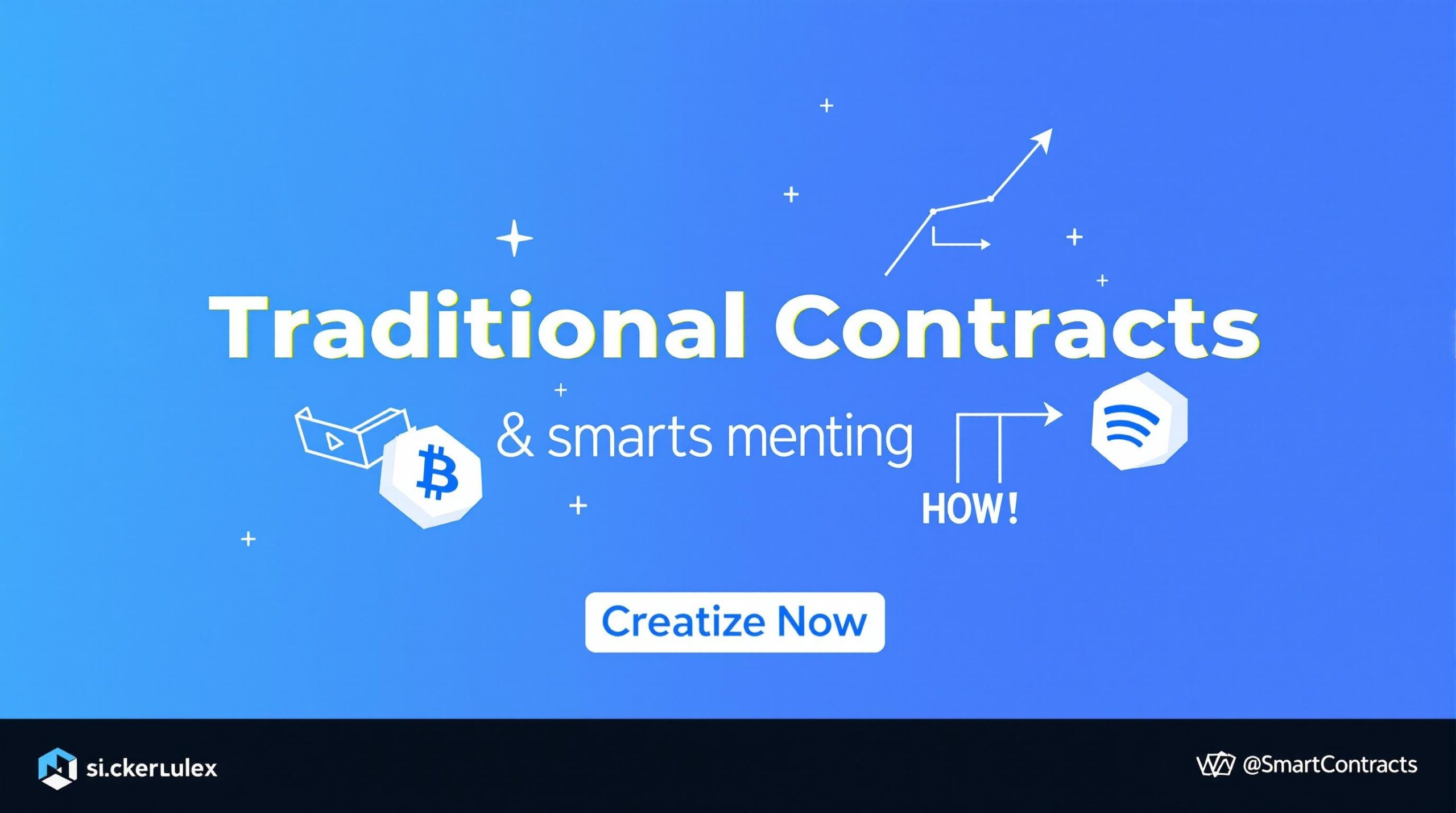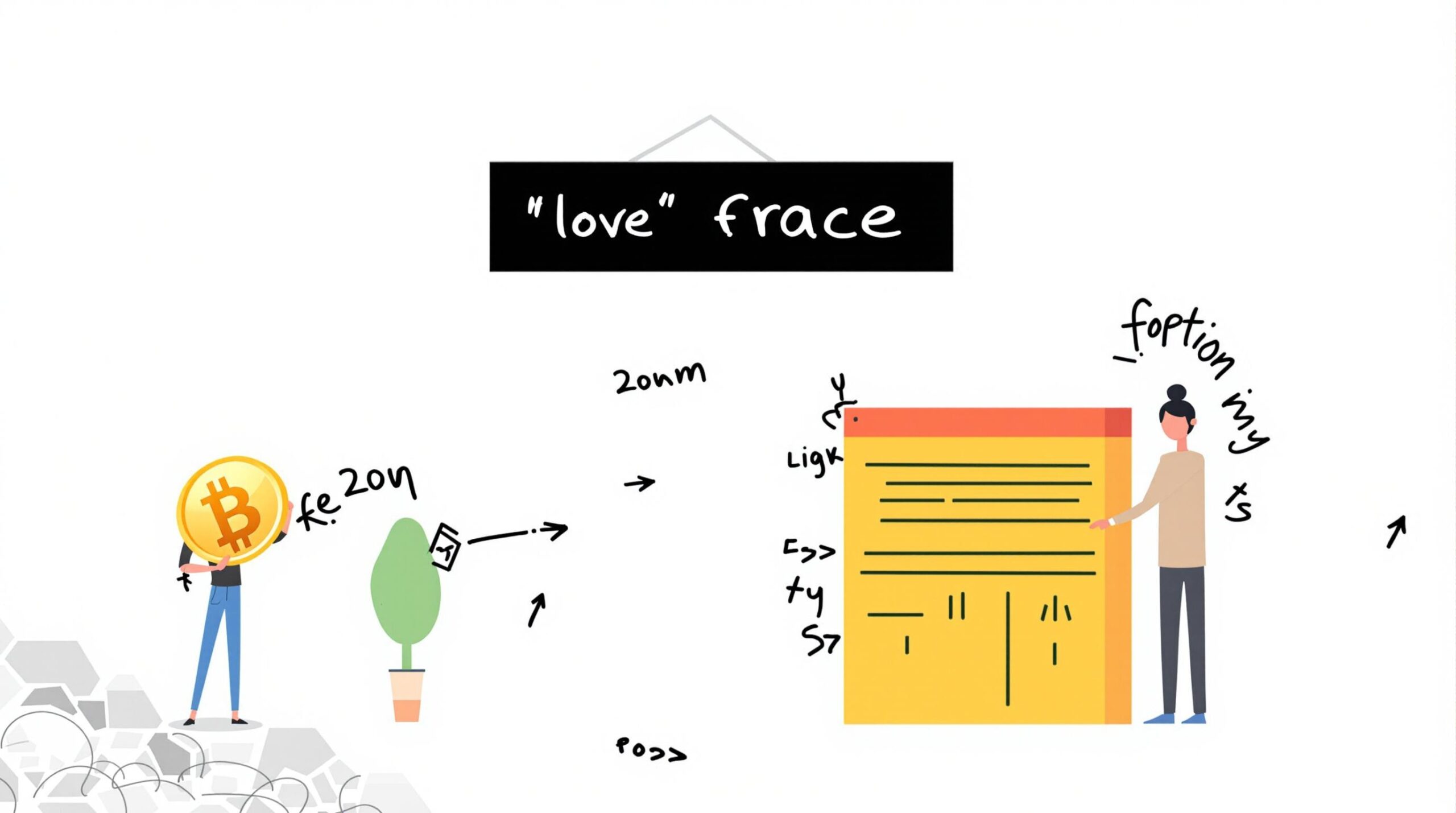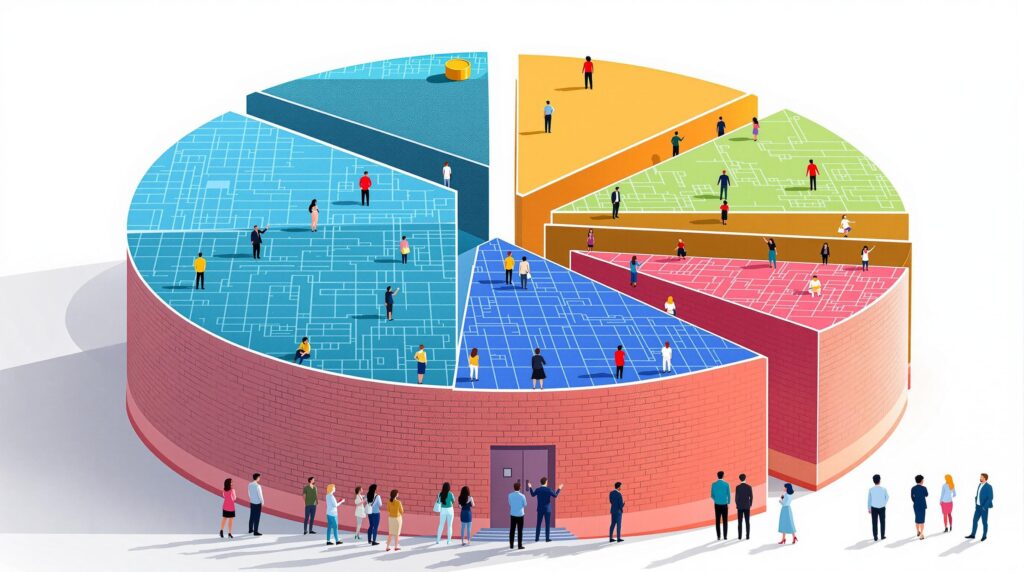Understanding the Basics: Smart Contracts
Smart contracts are revolutionizing the way we conduct agreements by embedding terms directly into computer code that automatically executes when predefined conditions are met. But what exactly sets them apart from traditional contracts, and how do they operate within the digital landscape like Africa’s evolving economy?
What is a smart contract? A smart contract is a self-executing contract with terms and conditions set in code, operating on blockchain technology and eliminating the need for intermediaries.
Smart contracts operate on a decentralized blockchain, like Ethereum or Solana, ensuring immutability and transparency. This makes them particularly useful for digital transactions in regions with emerging financial infrastructures, such as throughout Africa, where trust and transparency are paramount.
The Architecture of Smart Contracts
Unlike traditional contracts, which require manual enforcement and oversight by legal professionals such as lawyers, smart contracts are built to streamline this process. The architecture of a smart contract involves several key components:
- Code and Logic: The terms of the contract are embedded in code, which executes specific actions automatically when conditions are met.
- Decentralization: They operate on decentralized networks, reducing reliance on a central authority and resulting in fewer bottlenecks and less potential for fraud.
- Trust by Design: By using cryptographic signatures and distributed ledger technology, smart contracts enhance trustless agreements.
- Cost Efficiency: Since they minimize the need for intermediaries, smart contracts potentially lower transaction costs significantly.
The Role of Blockchain in Smart Contracts
Blockchain technology, the backbone of smart contracts, acts as a shared digital ledger. Each transaction is recorded in multiple places simultaneously, fostering transparency and trustworthiness. This decentralized nature is crucial in regions like Africa, where central systems might not always provide consistent oversight.
The automation of agreements not only accelerates proceedings but also enforces accuracy, reducing errors commonly found in manual contract management. Thus, smart contracts help businesses adapt more quickly to changes and enhance efficiency across various sectors.
“The $JARA token provides access and utility within the Jara ecosystem, offering an opportunity to fuel Africa’s digital asset economy.” – Jara
Elimination of Intermediaries
One of the most transformative features of smart contracts is their ability to eliminate the need for intermediaries, effectively reducing costs and increasing transaction speed. This is particularly beneficial for cost-sensitive markets where excessive fees can be prohibitive.
Consider real estate transactions, traditionally cumbersome and laden with fees due to intermediaries like brokers and legal advisors. Smart contracts can simplify such deals by automatically transferring ownership once payment conditions are fulfilled, thus opening doors for wider participation in Africa’s growing real estate market.
Smart Contracts in the African Context
With Africa’s rapid digital transformation, there is a growing demand for secure and efficient transaction methods that can keep pace with the continent’s burgeoning economies. By reducing fraud and improving efficiency, smart contracts can play a pivotal role in facilitating trade and investment across the region.
Jara, a pioneering platform in Africa, leverages the power of smart contracts to drive a $200B+ digital asset economy. The platform’s emphasis on a vertically integrated ecosystem—featuring blockchain, multi-chain wallets, and tokenization—aligns with Africa’s need for robust digital financial solutions.
How do smart contracts reduce the need for intermediaries? By automating the execution of contract terms upon fulfillment of conditions, smart contracts significantly minimize the necessity for human intermediaries, cutting both cost and time.
As Africa continues to embrace digital solutions, the role of smart contracts will undoubtedly expand, offering unprecedented opportunities for economic empowerment and development. The rise of platforms like Jara exemplifies how technology can reshape economic landscapes, create more inclusive financial systems, and drive sustainable growth.
Exploring Traditional Contracts: A Comparative View
Traditional contracts are the cornerstone of legal transactions across the globe, deeply embedded in the history of business and personal agreements. These contracts are written in natural language, which means they are crafted using everyday words and phrases that parties involved can comprehend. The creation of traditional contracts often involves meticulous detail to ensure all terms and conditions are clearly outlined, thus eliminating potential misunderstandings.
In Africa, traditional contracts play a vital role in both corporate and civil matters. They form the backbone of dealings, from real estate transactions to employment agreements, and even international trade. But what makes traditional contracts stand out, and how do they function?
What is a traditional contract? A traditional contract is a formal agreement between parties that outlines their rights, responsibilities, and obligations. It is written in natural language and relies on manual enforcement via legal systems.
At the heart of traditional contracts is trust. When two parties enter into a contract, they depend on the good faith of each other to fulfill the agreed terms. Historically, prior to the enforcement of contracts via legal systems, trust was the currency of transactions. In communities where verbal agreements were the norm, handshake deals cemented trust among parties.
Nevertheless, as commerce evolved, the need for a more structured approach became evident. This is where the legal system comes in, playing a crucial role in the enforcement of traditional contracts. Manual enforcement involves a third party—usually a court or arbitrator—intervening to resolve disputes. This layer of oversight aims to ensure that agreements are honored, and in cases of breach, appropriate remedies are applied.
The functioning of traditional contracts in Africa is also shaped by the continent’s unique legal landscape. Diverse legal traditions, from common law to customary law, influence how contracts are viewed and enforced. For instance, customary law, which is prevalent in various African cultures, may incorporate verbal agreements and societal norms alongside written contracts. In such a dynamic legal environment, the ability to draft and interpret contracts effectively is essential.
- Historical Dependency: Traditionally, contracts rely heavily on the explicit mutual understanding between parties. The history of a nation, such as Africa’s, can affect contract formation and enforcement.
- Trust-Based Execution: Unlike automated systems, traditional contracts require trust and manual enforcement, often necessitating [distinct legal systems](https://example.com/are-smart-contracts-legally-binding-what-you-need-to-know).
- Legal System Intervention: In instances of dispute, traditional contracts need legal intervention for resolution, adding layers of cost and time.
- Cultural Integration: Especially in Africa, laws vary significantly, affecting the nature and execution of contracts across regions.
This dependency on legal enforcement poses both challenges and assurances. Challenges arise from the intricacies of different [legal frameworks](https://example.com/smart-contracts-vs-traditional-contracts-whats-the-difference) that govern contracts in various jurisdictions. Meanwhile, the assurance comes from the idea that there is a path to recourse and resolution should disputes occur. However, the complexity and cost associated with this enforcement often lead parties to seek alternative solutions.
Jara, with its focus on bridging global capital to African assets, is uniquely positioned to navigate the traditional contract landscape. While leveraging cutting-edge technology for asset digitization, Jara respects the integral role traditional contracts play in current business ecosystems. By blending traditional means with state-of-the-art solutions, Jara offers not just a financial platform but a comprehensive strategy for modernizing African financial interactions.

Key Differences Between Smart and Traditional Contracts
Understanding the nuances between smart contracts and traditional contracts is akin to differentiating between sending a letter by mail and an email. While both serve to communicate or establish agreements, the processes, benefits, and limitations are quite distinct. So, what makes these two contract types so different?
Execution Speed
Smart contracts shine in their ability to execute automatically. These contracts use blockchain technology to self-execute when predefined conditions are met. Imagine a vending machine: you insert money, and the machine instantly delivers your drink. That’s the essence of a smart contract — a quick, seamless transaction that eliminates the need for intermediaries.
In contrast, traditional contracts often require a more substantial lead time for execution. They depend on manual processes and human intervention, from signing to enforcement. This can result in delays if any discrepancies or disputes arise during the contract’s lifecycle.
What defines the speed of smart contracts? Smart contracts execute automatically when conditions are met, making them quicker than traditional contracts, which rely on manual processes.
Cost Efficiencies
The automation and removal of intermediaries in smart contracts contribute significantly to cost reductions. Without the need for lawyers or brokers in every transaction phase, the overall expense is lower. Think of it as bypassing your travel agent and booking your flight directly online.
Traditional contracts, on the other hand, involve legal fees, administrative costs, and potential litigation expenses. Each party typically hires a lawyer to draft, review, and enforce the contract terms, which can get pricey.
It’s important to note, however, that while smart contracts can reduce costs, they require blockchain transaction fees — known as gas fees. These fees are a factor to consider, particularly on networks where gas fees can fluctuate significantly, such as Ethereum.
Enforcement Mechanisms
Smart contracts excel in enforcing agreements without the need for courts. The conditions and terms are coded directly into the blockchain, ensuring they are followed strictly and transparently. This technology becomes particularly powerful in regions with weak legal frameworks or enforcement mechanisms, such as some emerging markets in Africa.
Traditional contracts rely on the legal system and human judgment for enforcement. This can be both an advantage and a disadvantage; while it allows for flexibility and human interpretation, it also means longer resolution times and potential for subjective decisions. For transactions involving critical infrastructure, like Jara’s Lagos airport project, the choice between these two types of contracts can significantly impact the project timeline and cost efficiency.
How do enforcement mechanisms differ? Smart contracts enforce terms through code and blockchain, whereas traditional contracts rely on legal systems and courts for enforcement.
Security and Transparency
When discussing security and transparency of smart contracts, these blockchain-based contracts automatically uphold high security thanks to cryptography. Once deployed, they are difficult to alter, thus ensuring transparency. This feature makes them ideal for contexts where trust between parties is minimal.
Traditional contracts may be more susceptible to manipulation and require trusted third parties to maintain integrity. This dependence can lead to higher risks of fraud and mismanagement, particularly in environments with less stringent regulatory oversight.
Flexibility and Adaptability
While smart contracts offer many advantages, they are not without their drawbacks. Their code-based nature can make them less adaptable to changing circumstances without substantial recoding. It’s like trying to change the structure of a pre-made house versus re-decorating a room.
Traditional contracts are often perceived as more flexible, allowing parties to renegotiate terms as conditions evolve. This adaptability can be crucial in long-term projects that may encounter unforeseen changes in their environment, such as regulatory updates or economic shifts.
Conclusion
Both smart and traditional contracts have their place in the modern world, with their distinct advantages and challenges. The decision between them often depends on the specific needs of the parties involved, the nature of the transaction, and the regulatory environment. As Africa dives deeper into the digital revolution, understanding these differences is vital for businesses like Jara, poised to be a leader in the digital asset economy with its revolutionary $JARA platform.
For more insights into how these technologies are transforming the landscape, explore our in-depth articles on business automation.
When to Choose Smart Contracts Over Traditional Contracts
In our digital age, the decision to use smart contracts versus traditional contracts can significantly impact how businesses operate. Smart contracts are self-executing contracts with the terms of the agreement directly written into code. They’re particularly beneficial in scenarios requiring automation, enhanced security, and efficiency. But when exactly should you choose one over the other?
Ideal Scenarios for Smart Contracts
- Automation Needs: If your business operations require repetitive, predictable actions, smart contracts are highly effective. For example, supply chain transparency is greatly improved with blockchain technology, which automatically records each transaction step.
- Security Priorities: In industries where data integrity and security are critical, such as finance, smart contracts utilize blockchain’s robustness to prevent unauthorized access or tampering. Read more on reducing fraud with smart contracts.
- Efficiency Drives: Companies looking to streamline transactions can benefit significantly from smart contracts’ efficiency, minimizing the time and costs typically associated with manual contract execution. This use is evident in decentralized finance sectors, where efficiency is paramount.
Smart contracts are favored in environments calling for automation, security, and efficiency, transforming industries through these core strengths.
Industries Benefiting from Smart Contracts
While smart contracts offer numerous benefits, their application can be particularly advantageous in specific industries:
- Banking and Finance: With over $200 billion in African digital asset market potential, smart contracts offer a seamless, secure method for transactions, as seen in automation in industries that require trustless agreements.
- Real Estate: Smart contracts streamline property transactions by automating verification processes, transferring ownership once conditions are met without the need for intermediaries.
- Logistics: By utilizing blockchain technology, logistics companies can reduce fraud and errors, improve information flow, and enhance supply chain management.
Limitations and Traditional Contract Advantages
Despite their advantages, smart contracts are not without limitations. They’re inflexible once deployed, making it difficult to amend agreements if conditions change. Moreover, the legal enforceability of smart contracts is still a grey area in many jurisdictions.
Traditional contracts, however, possess a degree of flexibility and human discretion that can be advantageous in complex, nuanced agreements where precise interpretation is key. Certain industries may still rely on the human touch for negotiations and adaptations, underlining areas where traditional legal paradigms remain essential.
Traditional contracts offer flexibility and human discretion, making them suitable for complex, evolving agreements where smart contracts’ rigidity is a limitation.
As you consider integrating smart contracts into your operations, weigh the ideal scenarios we’ve discussed to make an informed decision. Whether you need the automation of smart contracts or the adaptable nature of traditional contracts, understanding these differences ensures you choose the right tool for your needs.

What are the legal implications of using smart contracts?
When considering the legal implications of using smart contracts, it’s crucial to understand that legally binding nature depends on jurisdiction and the contract’s adherence to local laws. Smart contracts must meet traditional contract elements: offer, acceptance, and consideration to be enforceable. Legal systems continue to adapt to address the complexities of digital agreements.
How do smart contracts ensure security and transparency?
Smart contracts ensure security and transparency by utilizing blockchain technology, which provides a decentralized ledger for recording transactions. This architecture makes smart contracts difficult to alter, enhancing their integrity and transparency. Furthermore, the code in smart contracts dictates execution, leaving no room for human error or manipulation.
Can smart contracts be used for complex transactions?
Yes, smart contracts can be used for complex transactions involving multiple parties and conditions. Their programmability allows for various applications, such as financial derivatives and gaming applications. However, it’s essential to ensure the contract’s code is thoroughly tested and audited to prevent vulnerabilities.
What industries benefit most from using smart contracts?
Industries such as finance, supply chain, and gaming are currently benefiting from the use of smart contracts. In finance, smart contracts automate complex processes, reducing transaction costs. Supply chains use smart contracts to enhance transparency and traceability, while gaming industries leverage them for secure transactions and play-to-earn models.

Related Practice Areas
Explore the other areas of law related to smart contracts and discover how they can complement your legal needs.
Discover What Our Clients Are Saying
At the forefront of our Smart Contracts & Automation practice is a deep-seated commitment to client satisfaction. Each case is handled with utmost care, as echoed in the appreciative feedback from those we represent.

Contact Jara for Your Smart Contract Needs
Are you ready to harness the power of smart contracts and revolutionize your approach to legal agreements? With Jara, you can explore seamless automation and enhanced security. Our team is dedicated to providing expert guidance to match your unique needs with the best solutions.
Embrace the future of contracts with Jara’s innovative & automated solutions. Download our app to explore how smart contracts can work for you!
Reach out to us at [email protected] or visit our website at www.getjara.xyz. Download the Jara app on Android or iPhone and take the first step towards smarter, streamlined contracts today.
Chinyere “Chi” Nnadi Bio
Founder and CEO, Jara | Smart Contracts Specialist
Content reviewed and enhanced by Chi Nnadi and his content team. Chi is a pioneering entrepreneur passionate about transforming Africa’s financial landscape through blockchain innovation. As the Founder and CEO of Jara, he leads efforts in developing robust infrastructure for converting African assets into digital tokens accessible worldwide. With his advanced Layer-2 blockchain solutions, Chi connects global investors to Africa’s vibrant digital asset markets.

















